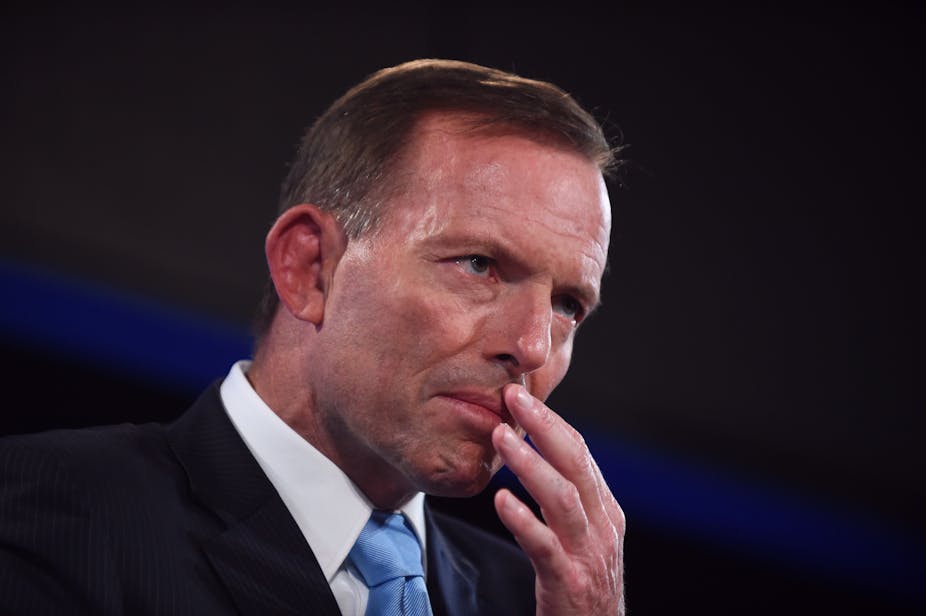The Liberal Party remains volatile and Tony Abbott’s position precarious after a National Press Club performance that avoided disaster but did not convince the doubters among his followers.
Abbott gave his colleagues notice he’d have to be blasted out. Those critics who hope he might be persuaded to take a walk must be prepared for a fight.
Abbott used the same argument Kevin Rudd made in 2013 when securing a Labor rule change that protected a leader. “Australians demand to know that the prime minister they elect is the prime minister they get,” said Rudd; in Abbott’s version, “Party rooms or caucuses choose leaders, but once they’ve gone to an election, things have changed. It’s the people that hire and frankly, it’s the people that should fire.” Abbott recalled he’d said this at the time of the Rudd and Gillard political assassinations.
Abbott gave pledges (heard often before) of consultation and collegiality; made retreats on his captain’s picks; and committed to “packages” on families and small business and jobs.
For all the work that had been poured into it, Abbott’s address itself was more pedestrian than inspiring, lacking a great deal of depth. Later he slid around some questions: for example, he lacked a convincing answer on how, after breaking promises from the last election, he could persuade the electorate next time that he’d meet his campaign commitments.
Queensland Liberal MP Ewen Jones, who had blasted Abbott on the Prince Philip knighthood, thought Abbott had “the tone for which I had been looking” at the Press Club. Jones doesn’t think “changing leaders is the answer to anything” but wants new messaging from Abbott and Treasurer Joe Hockey. The language should be “less corporate lunch and more cafe”, he says.
Another backbencher felt the speech was “pretty good” – but “it’s not going to make much of a difference. More than half the backbench want him to resign. The public are leading the charge on this – the MPs are getting smashed by their branch members and their constituents.”
Abbott may have bought himself more time; on the other hand, he may not. Highly experienced MPs don’t rule an early move in or out. Current polls are appalling for Abbott, and they’ll continue to come like dangerous firecrackers as parliament resumes next week.
The presence of Abbott’s chief of staff Peta Credlin remains a major irritant for some.
One senior Liberal MP, who says bluntly it’s time for both Credlin and her husband Brian Loughnane, the party’s federal director, to “exit stage left”, gives an extraordinary assessment of where the government is at.
“This situation is the worst of both Rudd and Gillard put together.
”[We have] the supreme command and control of the Rudd era, and the perception of misleading the Australian public [of the Gillard one]. We’ve got a lot of black marks against us.“
Defending Abbott has become a major ministerial duty. Scott Morrison, mentioned as a possible treasurer if Malcolm Turnbull became leader, spent much of Monday doing it in multiple media appearances. Cabinet meets on Tuesday and Wednesday. But how frankly will ministers speak to Abbott?
Some of the MPs who say Abbott must go are surprisingly unfocused on who should succeed him. Their attention is on moving away from him, rather than on who they are moving towards. But as time passes, opinion seems to be favouring Turnbull rather than Julie Bishop. At least this is the impression, in the absence of number-crunching. Electorally, Turnbull is seen as the better bet.
Some in the right hate Turnbull passionately but with others pragmatism prevails. For them, factional considerations pale beside the need to win the next election.
The Liberals have put themselves into the worst of places. Enough of them have torn at the leader to leave him deeply wounded. But they have not yet brought him down or fully thought through the consequences of doing so. How, when and where they move from here remain open questions.
Abbott casts it as a "test of character” for his colleagues. Encountering a “difficult patch”, “politicians pass the test when they do what is best for the long term, not when they give into short term fear”.
The issue for the Liberals is: what is best for the long term? For them, the test is less about their characters than their survival.

